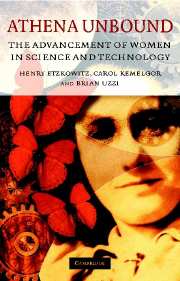Book contents
- Frontmatter
- Contents
- Acknowledgements
- Introduction: Women in science: Why so few?
- 1 The science career pipeline
- 2 Women and science: Athena Bound
- 3 Gender, sex and science
- 4 Selective access
- 5 Critical transitions in the graduate and post-graduate career path
- 6 Women's (and men's) graduate experience in science
- 7 The paradox of critical mass for women in science
- 8 The ‘kula ring’ of scientific success
- 9 Women's faculty experience
- 10 Dual male and female worlds of science
- 11 Differences between women in science
- 12 Social capital and faculty network relationships
- 13 Negative and positive departmental cultures
- 14 Initiatives for departmental change
- 15 International comparisons
- 16 Athena Unbound: Policy for women in science
- Appendix
- Bibliography
- Index
16 - Athena Unbound: Policy for women in science
Published online by Cambridge University Press: 08 September 2009
- Frontmatter
- Contents
- Acknowledgements
- Introduction: Women in science: Why so few?
- 1 The science career pipeline
- 2 Women and science: Athena Bound
- 3 Gender, sex and science
- 4 Selective access
- 5 Critical transitions in the graduate and post-graduate career path
- 6 Women's (and men's) graduate experience in science
- 7 The paradox of critical mass for women in science
- 8 The ‘kula ring’ of scientific success
- 9 Women's faculty experience
- 10 Dual male and female worlds of science
- 11 Differences between women in science
- 12 Social capital and faculty network relationships
- 13 Negative and positive departmental cultures
- 14 Initiatives for departmental change
- 15 International comparisons
- 16 Athena Unbound: Policy for women in science
- Appendix
- Bibliography
- Index
Summary
‘For women there are undoubtedly great difficulties in the path, but so much the more to overcome,’ exulted Maria Mitchell (1818–1889), the first female professor of astronomy in the U.S., at the then newly founded Vassar College. More than a century later, on the 175th anniversary of her birth, women's scientific aspirations are still restricted by ‘tradition and authority’ (Enna, 1993). Few female scientists are as happy as the nineteenth century astronomer Mitchell to have put up a brave front in the face of a host of gender-related problems. Despite significant improvement, especially in the numbers of women who wish to enter scientific careers, many of the organizational structures of science, and some scientists, continue to resist women's full participation. Additional steps are necessary, beyond encouraging women to take up science, to insure that science is open to them (Lovitts, 1996).
In this final chapter, we discuss the policy implications of our findings in terms of motivators and inhibitors that shape the experiences of women and conditions of inequality in academic science. First, the arguments behind each thesis are described and its accomplishments and shortfalls reviewed. Second, we argue for new policy recommendations related to department reform, the factor that is most relevant to the organizational issues explored in the preceding chapters and that we have identified as a means by which programs for change can be implemented.
Five strategies have been suggested during the past thirty years to promote improvement of the condition of women in academic science.
- Type
- Chapter
- Information
- Athena UnboundThe Advancement of Women in Science and Technology, pp. 225 - 250Publisher: Cambridge University PressPrint publication year: 2000



